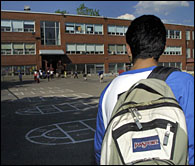Drop ins prevent drop outs
When the Metropolitan Montreal Board of Trade started recruiting volunteers five years ago to encourage secondary school students to stay in school it was logical that eventually they would turn to expertise from McGill.
 To stay or not to stay?
To stay or not to stay?PHOTO: Owen Egan |
|
The program -- called Operation Back to School -- sends professionals from various sectors, including academia, into high school classrooms to drive home the value of an education. With Montreal-area high schools hemorrhaging students at an alarming rate -- dropout rates reach 35% in some schools -- Quebec's ability to grow in the knowledge economy is in serious jeopardy.
As a member of the Montreal Board of Trade, Gregg Blachford was asked to participate in the program. "Operation Back to School" had a special meaning for the director of McGill's Career and Placement Services -- he had been a high school and technical college teacher for 17 years before coming to McGill.
"I enjoy getting back into school, I enjoy getting back in front of a class, and I enjoy engaging students in discussion," said Blachford. "And I hope, somewhere along the way, that some of them might be encouraged to remember some of the things I said."
Blachford said that he usually asks the students he sees -- who range in age from 14 to 16 years old -- how they feel about their future. He's pleasantly surprised to find that most feel fairly optimistic, and are already in the work force in part-time jobs.
Blachford stresses that there is a direct correlation between levels of education received and unemployment -- statistics show there is an 18% unemployment rate among those with only a high school education, while CEGEP grads have a less than 10% unemployment rate. The university graduate unemployment rate is less than 6%.
Mark Hollingworth is a lecturer in the Faculty of Management. Although currently ensconced in academia, he feels that teenagers who might want to leave school could identify with his own story. When he was in college he had his own doubts about the value of an education, and in fact briefly dropped out.
"How do you talk to these kids and tell them to stay in school without sounding like their parents? How can you get the message across without preaching? To a great extent it has to come from the heart -- and that's what I do, is tell my story," he said.
"My personal message, and I think this appeals to them, is that having an education is freedom -- so you can say 'Take this job and shove it.' I tell them that if you think listening to me is really boring and you'd rather be somewhere else, imagine when you're stuck in a job and you've got a job and you're facing that for the next 30 years. If you've got an education it gives you the freedom to start choosing."
Freedom to choose is a theme that Tanya Glavicic-Théberge also likes to address with the students she visits. The officer in technology transfer stresses to students that keeping educational options open is something they have to do as early as grade 10.
"Many of them haven't started to think about what they want to do. Usually only a very small minority has even thought about what they want to do beyond high school, or even what program in CEGEP they're going to take," said Glavicic-Théberge.
Glavicic-Théberge participates in a similar program to Operation Back to School -- one that focuses specifically on informing students about careers in science and technology. In a one-hour presentation, she tells them about the job markets, the variety of careers available in science, engineering and biomedical fields, and the kind of education they need.
"From a personal point it's very rewarding to be able to do this. I usually try to ask them to lean on the conservative side, and take the science courses because it keeps more doors open. Once you start dropping the math and the physics then you have to go back."
Telling kids how to be a scientist is almost secondary to biology professor Richard Roy. Convincing them that they would want to be a scientist in the first place is his goal.
"Scientists have a terrible reputation for being eccentric, with white hair coming out everywhere, with nerdy things hanging out of their shirt pockets. I don't fit into that -- I thought I could go into the schools and show them you don't have to look like that, you can be yourself," said Roy, who with his earring and high-energy personality hardly brings to mind "science geek."
Roy said that without a wide variety of new, well-trained and diverse people coming into science, research and technology will suffer in Canada. When he goes to schools, he makes a point of reaching out to populations who might be hesitant to go into university-level sciences.
"I saw this as my calling, this is some way to make a difference, to get into the school, to get those people that would be great scientists but shy away from it because of this terrible image," said Roy.

